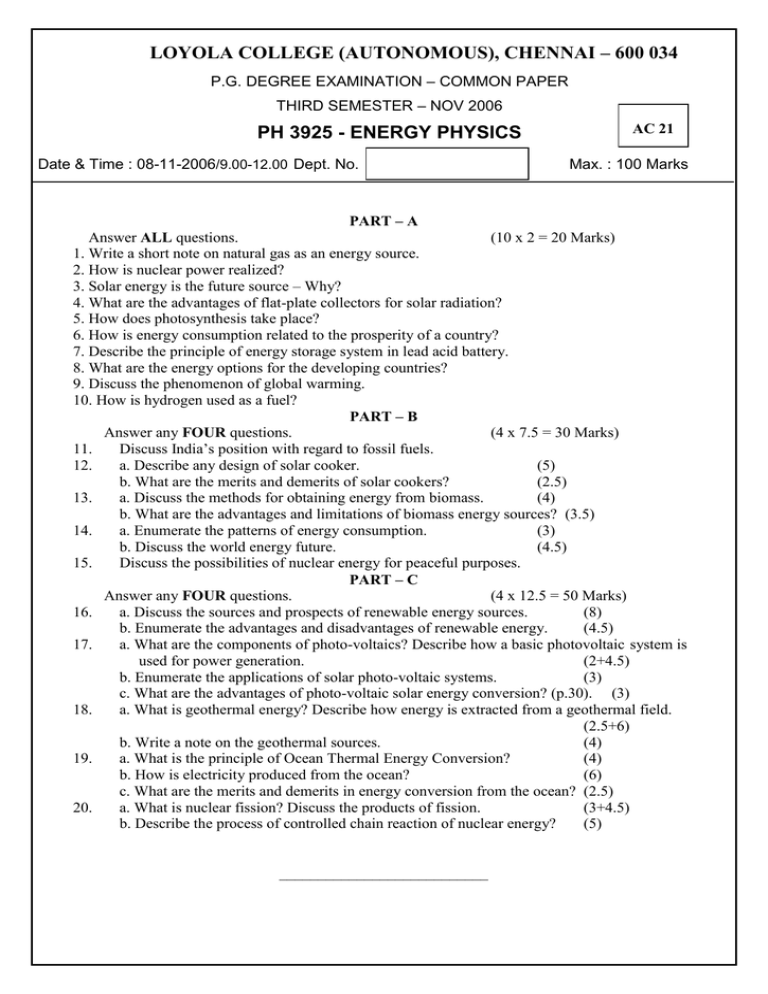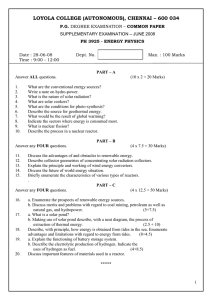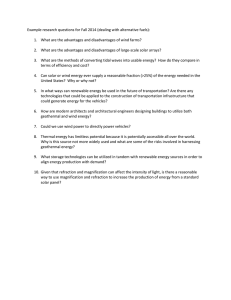LOYOLA COLLEGE (AUTONOMOUS), CHENNAI – 600 034
advertisement

LOYOLA COLLEGE (AUTONOMOUS), CHENNAI – 600 034 P.G. DEGREE EXAMINATION – COMMON PAPER THIRD SEMESTER – NOV 2006 PH 3925 - ENERGY PHYSICS Date & Time : 08-11-2006/9.00-12.00 Dept. No. AC 21 Max. : 100 Marks PART – A Answer ALL questions. (10 x 2 = 20 Marks) 1. Write a short note on natural gas as an energy source. 2. How is nuclear power realized? 3. Solar energy is the future source – Why? 4. What are the advantages of flat-plate collectors for solar radiation? 5. How does photosynthesis take place? 6. How is energy consumption related to the prosperity of a country? 7. Describe the principle of energy storage system in lead acid battery. 8. What are the energy options for the developing countries? 9. Discuss the phenomenon of global warming. 10. How is hydrogen used as a fuel? PART – B Answer any FOUR questions. (4 x 7.5 = 30 Marks) 11. Discuss India’s position with regard to fossil fuels. 12. a. Describe any design of solar cooker. (5) b. What are the merits and demerits of solar cookers? (2.5) 13. a. Discuss the methods for obtaining energy from biomass. (4) b. What are the advantages and limitations of biomass energy sources? (3.5) 14. a. Enumerate the patterns of energy consumption. (3) b. Discuss the world energy future. (4.5) 15. Discuss the possibilities of nuclear energy for peaceful purposes. PART – C Answer any FOUR questions. (4 x 12.5 = 50 Marks) 16. a. Discuss the sources and prospects of renewable energy sources. (8) b. Enumerate the advantages and disadvantages of renewable energy. (4.5) 17. a. What are the components of photo-voltaics? Describe how a basic photovoltaic system is used for power generation. (2+4.5) b. Enumerate the applications of solar photo-voltaic systems. (3) c. What are the advantages of photo-voltaic solar energy conversion? (p.30). (3) 18. a. What is geothermal energy? Describe how energy is extracted from a geothermal field. (2.5+6) b. Write a note on the geothermal sources. (4) 19. a. What is the principle of Ocean Thermal Energy Conversion? (4) b. How is electricity produced from the ocean? (6) c. What are the merits and demerits in energy conversion from the ocean? (2.5) 20. a. What is nuclear fission? Discuss the products of fission. (3+4.5) b. Describe the process of controlled chain reaction of nuclear energy? (5) ___________________________

